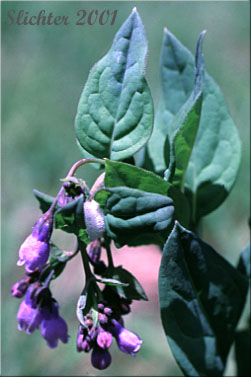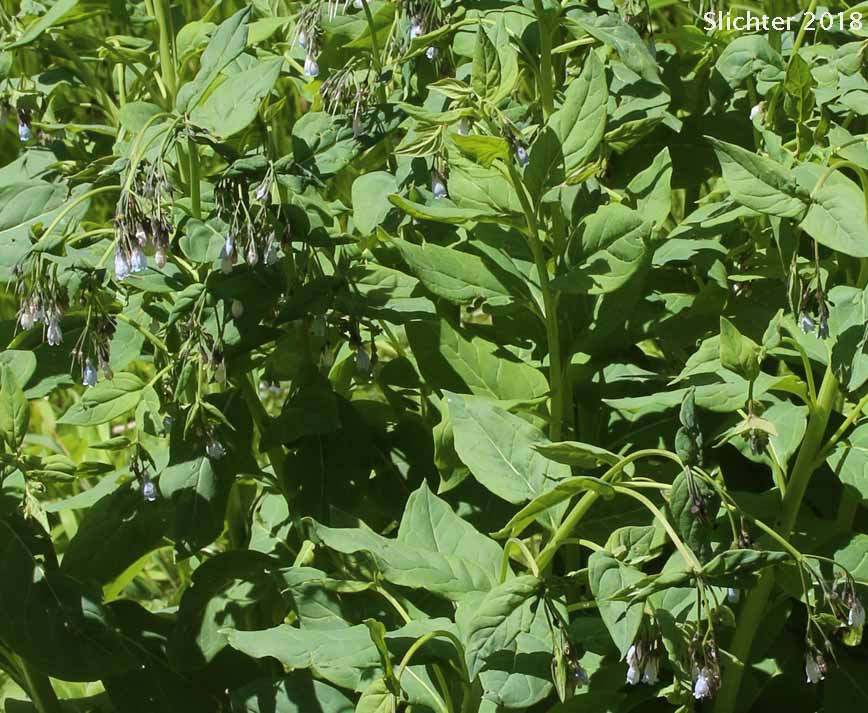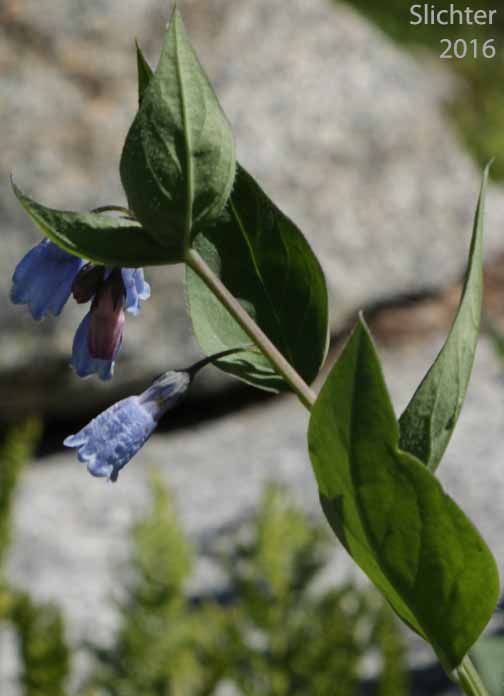[Bluebells and Lungworts: The Genus Mertensia East of the Cascade
Mts. of Oregon and Washington]
Tall Bluebells, Tall Lungwort, Tall Mt. Mertensia, Northern Bluebells, Panicle Bluebells
Mertensia paniculata var. borealis

This photo shows a close-up view of the pendant flowers and uppermost stem leaves of tall bluebells as seen along forest road #4030 on the northern slopes of Mt. Misery in the Umatilla N.F. of southeastern Oregon.........July 7, 2008. The flaring corolla limb of this species is about 1.2-1.6 times longer
than the narrower corolla tube.
 The
photo at right represents tall bluebells from Wild Cheat meadows in the Mt. Jefferson
Wilderness............June 18, 1992.
The
photo at right represents tall bluebells from Wild Cheat meadows in the Mt. Jefferson
Wilderness............June 18, 1992.
Characteristics:
Tall bluebells is an attractive wildflower with one to many
erect, leafy stems from 20-150 cm high. The stems and leaves may be smooth (glabrous)
or hairy. The leaves are largely on the stems, although the basal leaves when
present are long petiolate and heart-shaped. The stem leaves are well-developed
with short petioles and a lanceolate to broadly ovate shape, with the tips of
the blades tapered to a point and the base rounded. Leaves range from 3-14 cm
long and 1.5-7 cm wide and the blades are thin in cross-section and visibly
veined.
The inflorescence is a branched and open panicle with numerous
pendant, bluish-purple flowers. Individual flowers are tubular and 9-16 mm long,
with the limb or distal portion of the corolla 1.2-1.6 times as long as the
tube. The tube often has a ring of hairs inside. The calyx ranges from 2-6 mm
long, the 5 lobes cleft to below the middle or to the base. The calyx margins
are hairless.
Habitat:
Tall bluebells may be found in riparian areas on stream banks,
in wet meadows, damp thickets, wet cliffs and talus slopes from the foothills
to high elevations in the mountains.
Range:
Tall bluebells may be found from Alaska south to southwestern
and central Oregon and east to Quebec, Ontario, Iowa, Montana Mineral County,
and Idaho (Elmore and Adams Counties). It is found from the western base of
the Cascade Mts. and eastward in the Pacific Northwest except in the Olympic
Mts.

This photo shows another view of the flowers of tall bluebells as seen along forest road #4030 on the northern slopes of Mt. Misery in the Umatilla N.F. of southeastern Oregon.......July 7, 2008.

This photo shows a close-up view of a stem leaf of tall bluebells as seen along forest road #4030 on the northern slopes of Mt. Misery in the Umatilla N.F. of southeastern Oregon........July 7, 2008. The upper surface of the leaf blades
of variety borealis is glabrous.
 -
- 
Tall bluebells spotted along the North Fork Catherine Creek Trail #1905, Wallowa-Whitman National Forest........June 12, 2018.


This photo shows a mass of tall bluebells blooming along forest road #4030 on the northern slopes of Mt. Misery in the Umatilla N.F. of southeastern Oregon.......July 7, 2008.
 -
- 
Close-up of a flower of tall bluebells as seen at left along the Crawfish Lake Trail, Wallowa-Whitman National Forest..........June 2, 2013. The photo at right shows tall bluebells near the Eagle Cap Wilderness boundary where the Lick Creek Trail #1809 crosses Lick Creek, Hells Canyon National Recreation Area.....July 17, 2019..
 -
- 
Tall bluebells as seen along the East Fork Lostine River Trail #1662, Eagle Cap Wilderness.........August 4, 2016.
 -
-  -
- 
Tall bluebells blooming in a small tributary of Rattlesnake Creek along the main access road into Fields Spring State Park, Asotin County, Washington...........June 11, 2013.
 -
-  -
- 
Tall bluebells in bloom along the McCully Creek Trail #1812, Eagle Cap Wilderness.......July 19, 2019.
Paul Slichter
 The
photo at right represents tall bluebells from Wild Cheat meadows in the Mt. Jefferson
Wilderness............June 18, 1992.
The
photo at right represents tall bluebells from Wild Cheat meadows in the Mt. Jefferson
Wilderness............June 18, 1992.